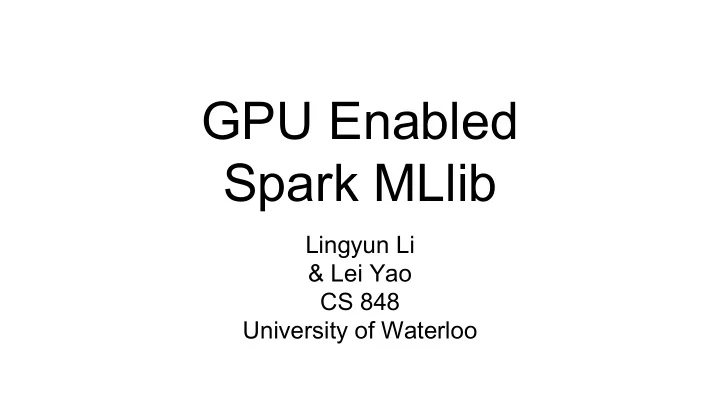

GPU Enabled Spark MLlib Lingyun Li & Lei Yao CS 848 University of Waterloo
Outline ● Motivation ● GPU calculation model ● GPUEnabler ● Spark MLlib Algorithms for GPU computation ● Implementation using GPUEnabler ● Performance evaluation ● Current & future work
Motivation ● Problem ○ Computation heavy spark machine learning applications ○ CPU computation bottleneck ● Goal ○ Accelerate Spark MLlib ○ Leverage high performance GPUs ○ Second dimension of distribution ○ Without change of user programs
GPU Calculation Model ● Five steps for GPU programming Shared Local ○ Allocate GPU device memory Memory Memory ○ Copy data on CPU main memory to GPU Thread Thread block device memory ○ Launch a GPU kernel to be executed on in Global Memory parallel ○ Copy back data from GPU memory to main All threads memory GPU ○ Free GPU memory CPU Main Memory
GPU Calculation Model BlockDim.x = N Thread Thread Thread Block 0 Thread …... 0 1 2 N Thread Thread Thread Thread Block 1 …... 0 1 2 N Global Thread Thread Thread Thread Block 2 …... Memory 0 1 2 N …... …… …... …... …... Thread Thread Thread Thread …... Block M 0 1 2 N int idx = threadIdx.x + blockIdx.x * blockDim.x Data Parallelism: Single Instruction, Multiple Data
GPUEnabler ● Offload specific tasks (GPU kernel) to GPU ● Get the data into a format that GPU can consume ● Read data from local memory to GPU memory and vice versa ● Applications can work in a heterogenous environment mapExtFunc() Two One reduceExtFunc() Transformation Action API APIs cacheGpu()
Algorithms Suitable for GPU Computation ● Large dataset ● Complex mathematical computation ● Low data inter-dependency ● Low dependency between cluster nodes
Spark MLlib Algorithms for GPU Acceleration ● Naive Bayes ○ Mainly count and aggregation ○ Not enough mathematical computation ● Decision tree learning ○ Mathematical computation (Information gain) hidden deeply under nested map functions ● LBFGS ○ Calculation uses external numerical processing library Breeze ● SVMs and linear regression ○ Not enough mathematical computation ● Logistic regression ○ Candidate for GPU acceleration
Implementation using GPUEnabler ● Write CUDA kernel ● Create and broadcast CUDAFunction objects ○ Information about CUDA kernel, input/output data type, constant arguments, etc. ● Call mapExtFunc and reduceExtFunc instead of map and reduce ○ Execution of CUDA kernel in parallel
CUDA Kernel
GPUEnabler APIs
Performance Evaluation ● Use logistic regression for classification ● GPU: Nvidia Tesla K80 # of data points # of features each data # of machine in cluster Use GPU Runtime (ms) point 1000000 10 1 No 1182 1000000 10 1 Yes 2826 1000000 10 2 No 1276 1000000 10 2 Yes 3494 2000000 15 1 No 6511 2000000 15 1 Yes 5938 2000000 15 2 No 5760 2000000 15 2 Yes 5639
Our Work ● Setup cluster with GPU, CUDA, Spark, HDFS and GPUEnabler ● Learn Spark MLlib algorithms ● Study Spark MLlib & GPUEnabler source code ● Integrate GPUEnabler & Spark ● Implement GPU Enabled MLlib algorithms ● Deploy and run GPU code on clusters ● Performance evaluation ● Future work: ○ Implement and evaluate more algorithms ○ Investigate GPU computation bottleneck
Thank you Questions?
Recommend
More recommend